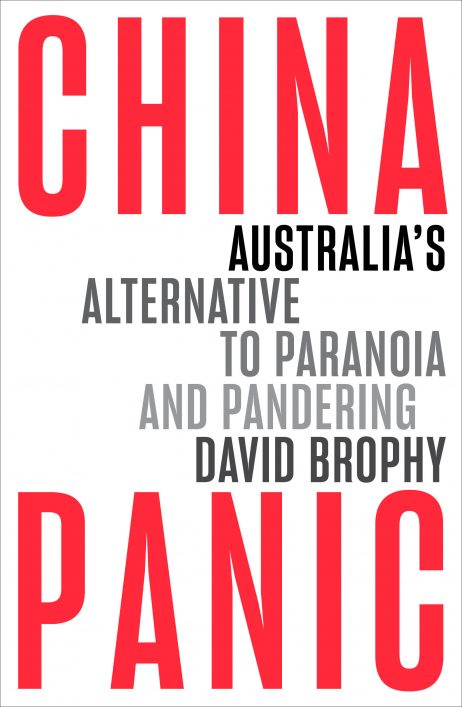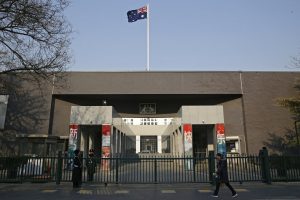Australia’s relations with China are currently at a decades-long low. As President Xi Jinping’s China has become more powerful and assertive, the consensus of the country’s political elites has swung rapidly from a view of Beijing as a vital economic partner of Australian big business to a perception of the rising power as a fundamental threat to Australian sovereignty and values.
In a provocative new book, “China Panic: Australia’s Alternative to Paranoia and Pandering” (La Trobe University Press), David Brophy, a senior lecturer in modern Chinese history at the University of Sydney, holds out a third option for how Australians should see and deal with the new China. Rooted in progressive values, his alternative is one that avoids both the “win-win” clichés of corporate engagement and the demonization of the present.
Brophy, whose academic research focuses on the origins of Uyghur nationalism, spoke with The Diplomat about what is shaping the hawkish turn in Australian public debate around China, the consequences that it has had for Chinese Australians, and how progressives should approach questions of human rights in China.
The negative shift in views of China among Australia pundits and policymakers is similar in many ways to that which has taken place in the United States, not least in terms of timing. To what extent do you think Australia’s turn against China a reflection of trends in the U.S., and to what extent does it reflect domestic political and cultural dynamics?
There’s clearly been a dialogue going on, but I don’t see Australia’s stance as a straightforward reflection of trends in the U.S. Australia was happy to continue profiting from its relationship with China well after Washington signaled its desire to confront Beijing via the “pivot to Asia.” I see Australia’s shift more as a response to perceptions, which grew with Trump’s election, that the U.S. was either unwilling or unable to uphold its dominant position in Asia in the face of China’s rise. The instinct this triggered was for Australia to begin noisily talking up the need to confront China, in part to signal its own willingness to do so, but also to encourage Washington. In doing so, they’ve obviously had to respond to perceptions from the American side that Australia was too deeply entangled with China to make such a turn. So yes, there has been a dialogue, but it’s one that’s involved a degree of wariness and second-guessing on both sides.
I don’t make much use of culture as an explanation for how we got to this point, but clearly, it’s legitimate to ask whether such a rapid turn in Australian sentiment towards China would have been possible were China not an Asian country that we have a long history of demonizing. Today, hawkish foreign policies and domestic racism certainly exist in a dangerous symbiosis. When COVID-19 arrived, paranoia towards Chinese Australians as a fifth column blended with the equally long-standing trope of Asians as carriers of dangerous diseases, creating a toxic mix that now has a life of its own.
I was also initially cautious not to put too much emphasis on domestic politics as a catalyst, i.e. on China-bashing simply as a populist vote-winner. It’s a line of criticism, valid as it may be, that tends to avoid the crux of the issue. (That may be why it’s now the Labor Party’s preferred line of attack.) Having said that, these domestic motivations are clearly in play now. In response to some very mild criticisms of the government’s tone, Liberal MP Andrew Hastie recently described opposition leader Anthony Albanese as a “risk of national security, and… not standing up for our country at all.” We’re going to see a lot more of this as we approach the next federal election.
It’s clear from the title of your book that you harbor serious concerns about the way that China is now being in Australia’s public discourse at present. What are the main worries that drove you to write the book?
My motivations were quite simple really – that Australia is pursuing policies that make its citizens less safe, that put our civil liberties at risk, and are stoking xenophobia and racism. Those facts alone should spur us all to seek alternatives to the current direction of things. But I was also anxious that the China debate not fall into the predictable rut of security interests vs. business interests: this is what the subtitle of the book is getting at. People have every right to be skeptical of a corporate-driven “engagement” policy towards China, but a military buildup and domestic national security paranoia are not the alternative.
From party politics to university campuses, Australian security commentary has been taken up by the threat of “foreign interference” from the Chinese state, which has been used as a pretext to pass new laws and augment the powers of Australia’s security establishment. Do you think the threat justifies the response? And what are some of the negative impacts that you have observed?
No, I think a lot of the claims made in this field have been exaggerated and don’t stand up to scrutiny. I’m critical of the way the media has often circulated flimsy narratives without due diligence, or care for the impact this can have on Chinese Australians. But the deeper issue has to do with framing. Episodes of undue influence-peddling or corruption reflect structural flaws in Australia’s political system, not a unique challenge to it emanating from China. Foreign lobbies of all kinds are only some among the many interests that can undermine democratic decision-making. The challenge is not to ring-fence the system by empowering Australia’s secretive security agencies, but to make the system more democratic, with measures that enhance transparency and accountability. So far, the steps that Australia has taken have done nothing on this score but have done a lot to stigmatize Chinese Australians seeking to exercise their democratic rights.
 What prescription would you offer Australian leaders for the current poor state of relations with China?
What prescription would you offer Australian leaders for the current poor state of relations with China?
My first prescription would be for more honesty. The Australian government made a deliberate turn towards confrontation with China in 2017, in full knowledge that this might provoke trade retaliation. When policies have the consequences they’ve been predicted to have, any outrage that politicians express can only be described as fake. Talk of China compromising Australian sovereignty is not a reflection of reality, but of the government’s efforts to whip up a kind of victimhood nationalism, which of course mirrors China’s own.
If there is a question of compromised sovereignty here, it involves the presence of American troops and intelligence facilities on Australian soil. If we don’t do something about that, the biggest questions in this debate – whether we go to war, for example – may well be decided for us. Australia’s posture should be one that seeks to deescalate and defuse tensions in the region, to demilitarize flashpoints like the South China Sea, and put forward credible, consistent advocacy for principles such as self-determination.
Domestically, I think a lot of recent policies can and should be undone. The foreign interference laws go too far in criminalizing things that should not be criminalized, and put almost anyone who engages in political activity that involves international networking at some risk. Chinese academics who’ve had their visas ripped up should be invited to apply again. I see no value in the treasurer blocking Chinese investment in something like a dairy farm. Politicians also need to remedy the damage done – to take a firm stance against anti-Asian prejudice and stop indulging claims that Chinese immigrants lack some mythical set of “Australian values.”
Stepping back, though, the issue here is deeper than relations with China; it’s about Australia’s role in the world. Australia’s decision to escalate tensions with China wasn’t driven by unreflexive support for the U.S., but by Australia’s own ambitions for influence in the region – including, but not limited to, a desire for an exclusive sphere of influence in the Pacific. Regardless of the outcome of the U.S.-China rivalry, this long-standing proprietary attitude to sovereign nations that find themselves in Australia’s “backyard” has the potential to spark hostilities with China well into the future. We’re hardly going to be in a good position to criticize China’s imperial ambitions if we’re oblivious to, or supportive of, Australia’s own.
In the context of increased geopolitical rivalry between China and the U.S., discussions about human rights in China – especially issues like the mass incarceration of Uyghurs in Xinjiang and the snuffing out of democracy in Hong Kong – seem to have become dominated by the most hawkish voices. For this reason, you argue, it is very unlikely to make much difference to the situation inside the PRC. How should those on the progressive side of politics should approach questions of human rights in China?
I think media exposure and international campaigning have made a difference in certain respects, but you’re right, I don’t think that state-level actions today can have much effect on the big picture. Strident declarations of Cold War against China, such as we saw from Scott Morrison in Perth on the eve of the G-7 meeting, leave China with little incentive to acquiesce to foreign criticism; they will very likely conclude that the hostilities are here to stay.
I would characterize the situation in these terms: the conservative instinct on China is to particularize, to emphasize the distinctiveness of China’s system and its domestic rights violations, and link these to other Western grievances centered on China – be it on trade, defense, what have you. The progressive instinct is to generalize, to see the commonalities between China’s actions and situations of oppression elsewhere – whether it involves racism, Islamophobia, or attacks on democratic rights – and campaign against them on that basis. This requires us to recognize something that [U.S. Senator] Bernie Sanders said last week, that the “primary conflict between democracy and authoritarianism … is taking place not between countries but within them.”
Clearly not all progressives see things this way. Western actions such as the Iraq War have left many around the world skeptical of the possibility of generating political pressure on governments other than via rival governments. Some conclude, on that basis, that the only way to pressure China on human rights is to support the U.S., while others take the opposite tack, that the only way to restrain U.S. warmongering is to support China. Part of the task, therefore, is to prosecute this debate, and win back the principle that change occurs through popular mobilization and people-to-people connections that cross national divides. We should support solidarity campaigns with victims of repression in China that embody these principles, and help these campaigns find allies in the wider progressive movement.

































